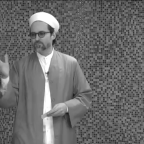Text of speech by Sayyid Munavvar Ali Shihab Thangal at the Al Nahda international Arabic Seminar, Kerala, Aug 30 2014
I convey my immense pleasure and extreme pride for being part of this outstanding academic journey on the very theme “Modern Arabic Literature on Spiritual Science from India and Arab World”. This chance which I got to preside the session is unarguably valuable in the sense, I am sure, this conference will lead into many worthy thoughts and academic explorations of a subject which is being lively and practically experienced in the world today. I thank the team of Annahda Arabic Magazine, whose efforts in building a key space for Arabic language and its literature are exceptionally praiseworthy.
Around 1000 AC, the teachings of Sufism and its doctrines were put into writing. For the next centuries until this modern age, Sufi literature flourished in the form of manuals, mystical tales and anecdotes, treatises on Islamic theology, philosophy, metaphysics and mystical poetry. Sufi manuals were for the instruction and practice of new experiences in various orders. They took a form of master-disciple instruction on correct behavior and conduct within the order. They also dealt with strict obedience to the master – almighty Allah, methods of “dhikr” and meditation, and also with piety and devotion to God. Tales and anecdotes in the form of literature from the Sufi world are really meant as “teaching tales,” with the purpose of driving home a moral or mystical point. There we have to acknowledge many of greatest Sufi scholars whose philosophical thoughts along with mystic journey seized the mind of people irrespective of their religion, and some of them were Imam Al-Gazali, Ibnu- Arabi and Faridud-Din Attar.
Studies based on classical Sufi works are still subjects for Sufi contemplation and meditation around the world even today. Sufi poetry is recited by Sufis to enhance mystical awareness. The world even now has been behind the contemplative study of Sufi poets who lived in the classical era such as Arabic Sufi poet Ibn-al-Farid, and Persian poets such as Hafiz, Sa‘di, Jami and Rumi. Jalaludheen Rumi perhaps is the best known for his monumental poetic works called the Mathnavi and Divan-i-shams. Through this intoxicating Sufi poetry, Sufi poets like Rumi call our mind into the trials of separation from the Beloved and the joys of union with Him. It is noteworthy to mention here that the bestselling poet of America in 2006 was not Whitman, Dickinson, Frost or Emerson but the Sufi mystic; Jalal-uddin Rumi, who was born in Afghanistan, on the borders of the Iran. The poetry and other modes of literature by such Sufi scholars retain even today a universal and timeless appeal.
Sufis commonly called the direct knowledge of God ―unveiling. Partly because unveiling often takes the form of a visionary, imagistic knowledge, they make frequent use of Sufi literature to express their teachings about God, the world and the human soul. Many of them felt that Sufi literature was the ideal medium for expressing the truths of the most intimate and mysterious relationship that human beings can achieve with God, that is, loving Him and being loved by Him.
And when it comes to modern space of Sufi literature in Arabic language, we have some great contributions of Sufi literature from personalities such as Abdullah bin Mahfudh ibn Bayyah and Shaikh Muhammad Alawi al-Maliki from Saudi Arabia, and Habib Ali al-Jifri and Habib Umar bin Hafiz from Yemen. In contemporary Indian scenario of Sufi Arabic literature, we have to name many of wonderful pieces from the world of Sufi scholars like Shaikh Ahmed Raza Khan Barelvi, Shaikh Akhtar Raza Khan, Shaikh Tajuddin Muhammad Badruddin and Kilakarai Thaika Shuaib. Indeed, the genre of Sufi Arabic literature has an undeniable place in the literary world of today and this conference and its motive underline this fact.
I give my extreme adherence to this conference and wait for some wonderful moments of academic presentations and scholarly discussions. Thank you all. Thank you so much. AssalamuAlaikum.



